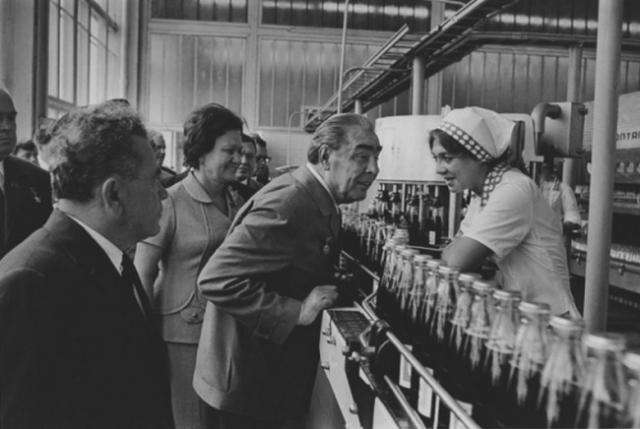In segment 25b Homo Sovieticus.
25段第二部分,蘇維埃人
We encounter the homo sovieticus or new Soviet man which it was fondly believed that communism would ultimately produce.
我們所看到的蘇維埃人,或是新蘇聯人,對他們來說,都盲目地相信共產主義終將開花結果
In fact years of deprivation and propaganda and anti-intellectualism had made the Soviet populous even too apathetic to be cynical.
事實上,多年的剝削和政治宣傳以及反智主義,使得蘇聯人民心灰意冷,沒有心情憤世嫉俗
Russian science, once the envy of all Europe,
俄國的科學一度是歐洲羨慕的對象
had been devoted to strictly military purposes for so long that the intelligentsia had basically gone into hibernation.
全部貢獻給了嚴格的軍事目的很長時間,知識分子基本上處于沉寂狀態
That is to say that the lucky ones who avoided the Gulag and the psychiatric hospitals.
這就是說,有些幸運的人就躲開了古拉格勞改所和精神病院

In Segment 25c, Gerontocracy,
25段第三部分,老人政治
We trace the era of Leonid Illych Brezhnev
回想一下勃列日涅夫統治時期
a man whose bluff, pleasant personality, disguised a tiny alcohol sodden brain a perfect non-entity,
他粗豪坦率,親切和藹的個性,他那狹隘愚笨的頭腦,他是一個徹底的無足輕重的人
he did what he could to let the Soviet Union slip down in to a mess of apathetic despair.
他所做的一切,都讓蘇聯滑入了一團糟和絕望中
Brezhnev was not as some believe old and senile, he was merely in his late 50's when Khrushchev was deposed in 1964.
勃列日涅夫不像有些人認為的那樣是個年老體衰,在赫魯曉夫1964年被撤職時他當時還不到60歲
Brezhnev's handling of the Czechoslovakian Prague spring of 1968 was vigorous
勃列日涅夫處理1968年捷克斯洛伐克的布拉格之春很是強硬
but eventually he came to exemplify the notion of Gerontocracy, rule, and this is the definition, rule by extremely old men.
但最終他開始用自己的行為說明老年政治的概念、規則,這兒有個定義,由非常年老的人進行統治











